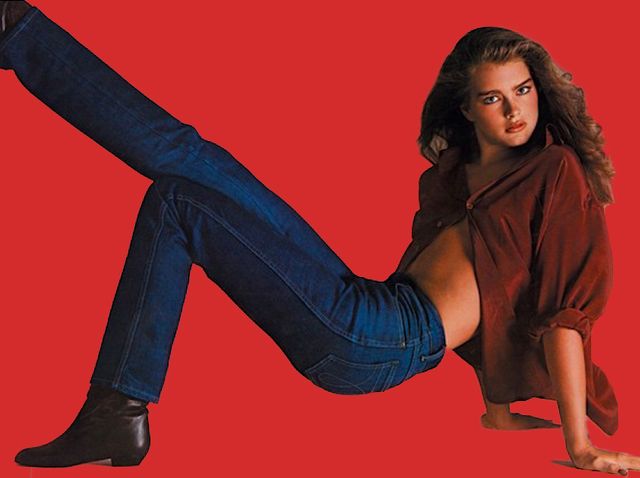Barring basics such as underwear and socks, blue jeans are the most popular garment ever. They are what many of the Rana Plaza workers in Bangladesh were sewing or inspecting when the building came crashing down on April 23, 2013, killing 1,134 and injuring 2,500 workers, making it the deadliest garment factory accident in modern history. Jeans were the backbone of American textile and garment manufacturing, until Levi's offshored those jobs. They are also hyper-polluting—in their creation, and in their afterlife.
除了內衣和襪子等基本款,藍色牛仔褲是有史以來最流行的服裝。2013年4月23日,孟加拉國拉納廣場發生倒塌事故,造成1134人死亡,2500人受傷,這是現代史上傷亡人數最多的服裝廠事故。牛仔褲曾是美國紡織和服裝制造業的支柱,直到李維斯將這些工作轉移到海外。在創造和使用中,也是高度污染的。
Jeans embody all that is good, bad and awry in fashion.
牛仔褲體現了時尚界所有的好、壞、歪的東西。
Nothing Comes Between Me and My Calvins
沒有什么能把我和我的Calvins分開

Denim remained a niche textile until the early 1870s, when a tailor named Jacob Davis asked his fabric supplier, Levi Strauss, for help mass-producing his most recent design: workpants with metal rivets at key stress points. If Strauss would cover the hefty $68 patenting fee, Davis proposed, the two men could be business partners. Today, Levi Strauss & Co. still design and sell the majority of jeans. It is one of the most successful apparel brands, ever.
牛仔布一直是一種小眾紡織品,直到19世紀70年代初,一位名叫雅各布·戴維斯的裁縫請他的布料供應商李維·施特勞斯幫忙量產他最新的設計:在關鍵受力點有金屬鉚釘的工作褲。戴維斯提議,如果斯特勞斯能夠支付68美元的高額專利費,兩人就可以成為商業伙伴。今天,李維斯公司仍然設計和銷售大部分牛仔褲。它是有史以來最成功的服裝品牌之一。
And blue jeans' popularity steadily grew, until they received an unexpected bump in the 1970s—from all places, Seventh Avenue.
藍色牛仔褲的受歡迎程度穩步上升,直到20世紀70年代,意外地受到來自第七大道各地的歡迎。
With the women's liberation movement and the popularity of more casual dress, New York's fashion designers dreamed up a new fashion category: designer jeans. "Jeans are sex," Calvin Klein said. "The tighter they are, the better they sell."
隨著婦女解放運動和休閑服裝的流行,紐約的時裝設計師們想出了一個新的時尚類別:名牌牛仔褲。“牛仔褲就是性感,”Calvin Klein說。“越緊,賣得越好。”
To hammer home his point, in 1980, Klein cast 15-year-old actress-model Brooke Shields for his jeans commercial. "You want to know what comes between me and my Calvins?" she purred in her childlike voice, as she sat spread-eagle in a pair of his jeans and a taupe blouse. "Nothing." The ad was so provocative, the New York affiliates of ABC and CBS promptly banned it. But it had already worked its spell: Klein sold 400,000 pairs the week following the ad's debut, then two million a month after that. Jean sales rocketed to record heights: more than half a billion were purchased in 1981 alone.
為了強調他的觀點,1980年,克萊因讓15歲的女演員、模特波姬·小絲為他的牛仔褲廣告代言。“你想知道我和Calvins之間的關系嗎?”她穿著他的牛仔褲和灰褐色上衣,像一只展翅的老鷹,坐在那里,用孩子般的聲音發出呼嚕呼嚕的聲音。“沒什么。”這則廣告如此具有挑釁性,以至于美國廣播公司和哥倫比亞廣播公司的紐約分公司立即將其封殺。但它已經發揮了它的魔力:在廣告發布后一周,Klein賣出了40萬條,之后一個月賣出了200萬條。牛仔褲的銷量飆升到創紀錄的高度:僅在1981年就售出了5億多件。
譯文由可可原創,僅供學習交流使用,未經許可請勿轉載。












